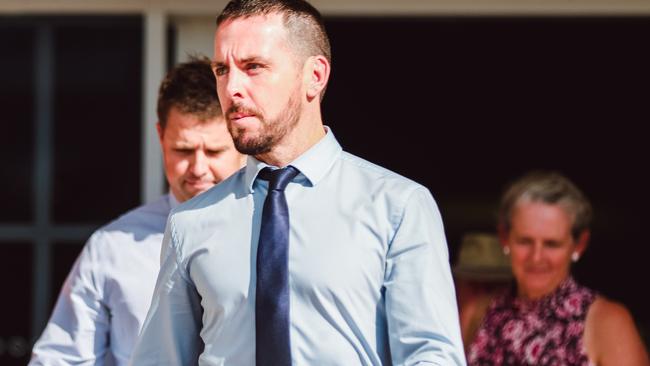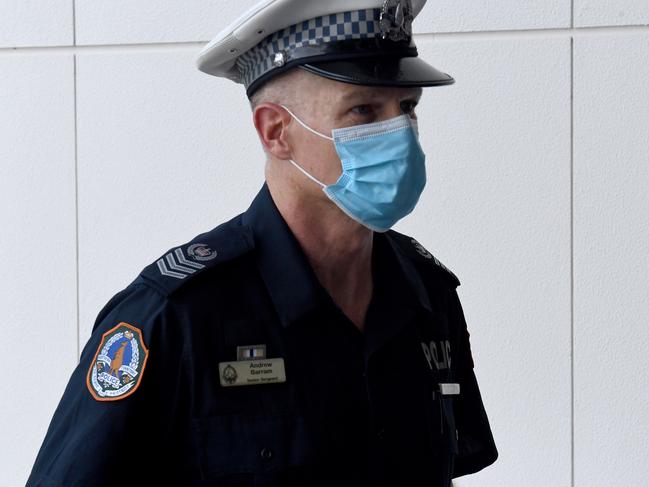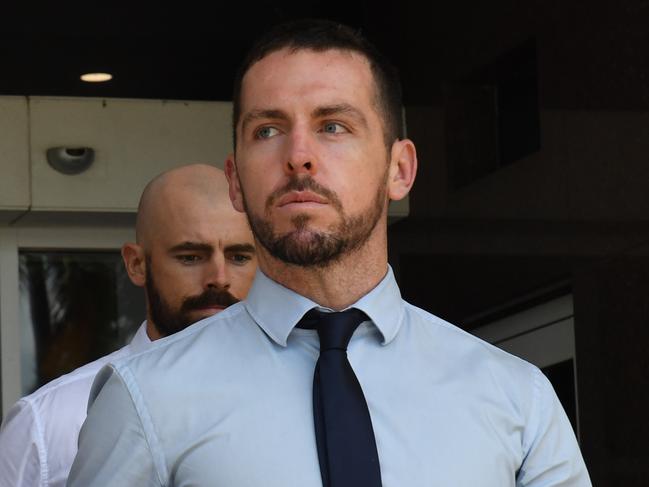Report into 2019 NT Police fatal shooting claims ‘investigative bias’ in pursuit of murder charge
A report tendered at the inquest found ‘investigative bias’ was evident in the force’s pursuit of charges against Zach Rolfe but had been ‘reversed to the detriment of the accused’.

Northern Territory
Don't miss out on the headlines from Northern Territory. Followed categories will be added to My News.
Northern Territory police relied on the “outdated” opinion of a local use-of-force expert and a highly-paid international criminologist who collaborated with investigators in its pursuit of a murder charge against former constable Zach Rolfe, according to a report prepared for the Coroner.
The report by Commander David Proctor into the 2019 police shooting of Kumanjayi Walker at Yuendumu was released by Coroner Elisabeth Armitage on Thursday.
It concludes there was “investigative bias” that was “detrimental to the accused” during the pursuit of a murder conviction against Mr Rolfe over the fatal shooting of Mr Walker.
This included the use of American criminologist Geoffrey Alpert who sought advice from detectives while being paid $375-an-hour to be an independent use-of-force expert.
Commander Proctor and another coronial investigator, Superintendent David Pollock, detail how the police investigative team failed to follow the advice of the office of the Director of Public Prosecutions and secure an interstate subject matter expert to provide an opinion that the three shots fired by Mr Rolfe during his attempt to arrest Mr Walker were unjustified.
After watching body worn video footage of the shooting, the DPP provided interim advice that there was a “prima facie” case that Rolfe was criminally liable over the shooting.
But further evidence from subject matter experts was required to support the case.
Police obtained an opinion from NT Police detective Senior Sergeant Andrew Barram who provided a statement that the second and third shots fired by Mr Rolfe were not justified because they were not reasonable or necessary in the circumstances “having regard to the Force Philosophy”.
Commander Proctor is critical of Sergeant Barram’s evidence, which he says played a pivotal role in the prosecution of Mr Rolfe.
“In reaching a conclusion Barram referenced materials to his statement that were outdated,” the report says.
“There was no challenge or peer review by investigators conducted on the statement of Barram.

“It was accepted as reliable without being subject to any scrutiny by investigators.”
Commander Proctor was also critical in the report, which was tendered to and released by the inquest, of the decision to include Sergeant Barram as part of a police delegation that travelled to Yuendumu less than a month after the shooting and spoke to members of Mr Walker’s family about the investigation.
“It was highly inappropriate for Barram to attend a meeting of this type and it potentially compromised his integrity and independen(t) status as an ‘expert’ by doing so,” the report says.
Sergeant Barram was the only subject matter expert used by the prosecution at Mr Rolfe’s trial last year, where he was found not guilty and acquitted of all charges.
According to Commander Proctor’s report, Deputy DPP Matt Nathan SC had warned against this approach.
The report contains an email sent by Acting Superintendent Kirk Pennuto – the investigator in charge of Operation Charwell, which was investigating the shooting – on January 6, 2020, following a conversation with Mr Nathan.
“An independent UOF SME (use-of-force subject-matter-expert) review conducted by another Australian counterpart jurisdiction is very important for a number of reasons,” the email says.
“Mr Nathan’s view is that such a review will only be of meaningful value if conducted by a current practitioner who has worked in a similar context, risen through the ranks and now reviews use-of-force while being actively involved in use-of-force police/training within Australia.”
According to the email Mr Nathan also raised concerns about how Sergeant Barram could come “under hostile attack in any cross examination”.
“Additionally, while there is no offence directed towards D/S/Sgt Barram his experiences in the area of fatal police shootings cannot compare with those of his contemporaries,” the email says.
Mr Nathan advised a recently retired Australian expert could potentially be used, but this was “a less than perfect situation from a criminal prosecution perspective”.
He also warned against the use of an international expert, saying they could be useful in a coronial setting, but “in the criminal court this is a large risk to the prosecution for a number of reasons”, including absence of context and relevance, and the fact they could be “portrayed as an ivory tower academic”.
Despite this advice police engaged Professor Alpert as its only other subject matter expert.
Sky News has previously revealed Professor Alpert was paid almost $100,000 to write a report supporting the prosecution’s case.
Superintendent Pennuto’s email notes Professor Alpert charges an hourly rate of $375.
“Despite a number of highly regarded use-of-force experts from within Australia being nominated to Pennuto no attempt was made to engage them due to public comments made by the Police Federation of Australia that they were supportive of Zachary Rolfe’s behaviour,” Commander Proctor writes.

“Instead, a critical decision was made to engage an overseas expert, contrary to the advice of the DPP.”
Commander Proctor raised further concerns about emails exchanged between Professor Alpert and the officers investigating the case which he said suggested the investigating officers were editing the report of their independent expert.
In one email sent on February 14, 2020, Professor Alpert writes to detective Sergeant Wayne Newell attaching a draft of his preliminary report.
“It will give you an idea of the direction I am taking,” Professor Alpert writes.
“Please let me know if there is more to review and if there are areas I have missed.
“Have I addressed all the areas (sic) you wanted me to include. I may address some issues in summary and opinions but am happy to reorganize.”
In another email sent to Sergeant Newell on February 29, 2020, Professor Alpert writes:
“Would you please resend me the draft of my report on which you made updates and comments?”
Commander Proctor also noted that Professor Alpert was “adverse to other ‘use-of-force’ experts who may potentially challenge his opinions and, by default, is subject to contextual bias”.
Professor Alpert was used as a witness during Mr Rolfe’s committal hearing, but he was dropped as a witness ahead of the Supreme Court trial.
Commander Proctor writes in the report released by the inquest that it is difficult to accept that “either Barram or Alpert could claim their ‘neutrality’ as an expert”.
“Barram was firmly ensconced within the investigation team and Alpert was contracted to provide evidence by the NTPOL executives who formed part of the Operation Charwell investigation and who approved his selection, in contrary to the advice of the DPP,” the report says.
“Not surprisingly both Barram and Alpert provided identical opinions given access to the same restricted information.”
Commander Proctor compared Mr Rolfe’s case to that of an investigation into the police shooting of an Aboriginal man known as Jabanardi at Ti-Tree in the Northern Territory in 1980.
“On that occasion the Royal Commission into Aboriginal Deaths in Custody Inquiry that followed was highly critical of the investigative bias exhibited by police in favour of the accused to the extent that it was suggested that such obvious bias warranted internal police discipline,” the report says.
“Over 40 years later the investigative bias is still evident but now reversed to the detriment of the accused.”
Matt Cunningham is the Darwin Bureau chief and Northern Australia correspondent for Sky News.
More Coverage
Originally published as Report into 2019 NT Police fatal shooting claims ‘investigative bias’ in pursuit of murder charge





